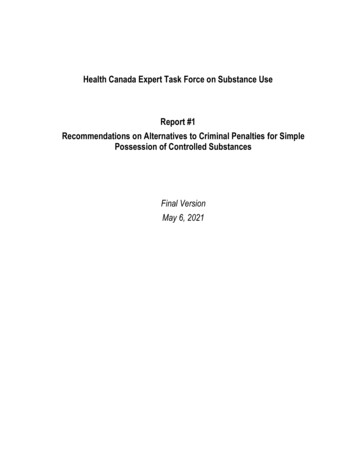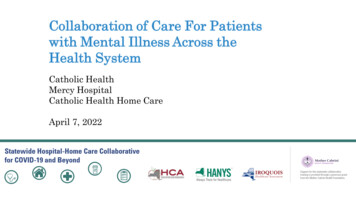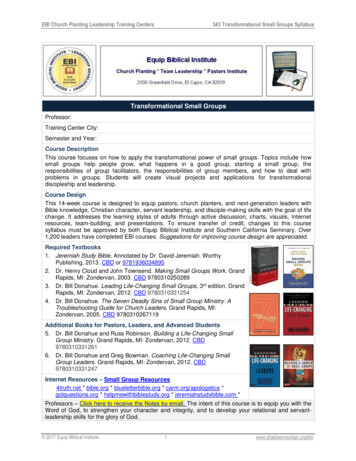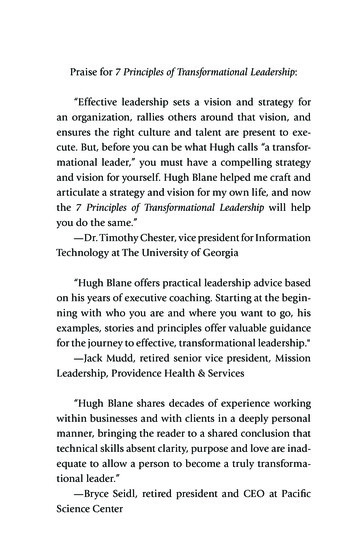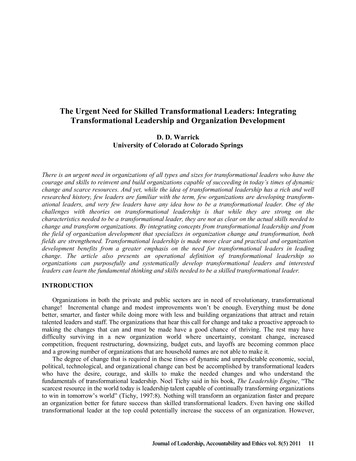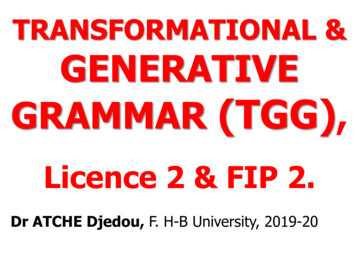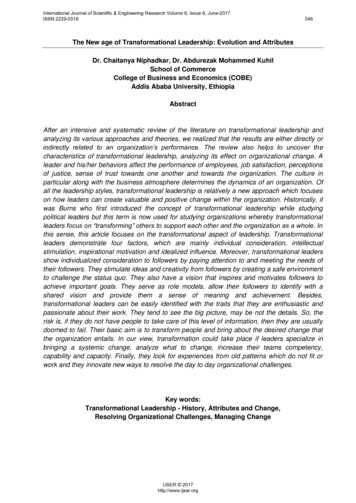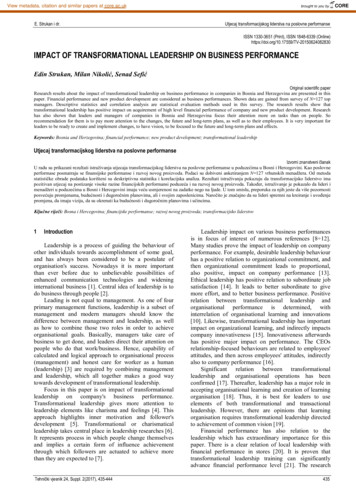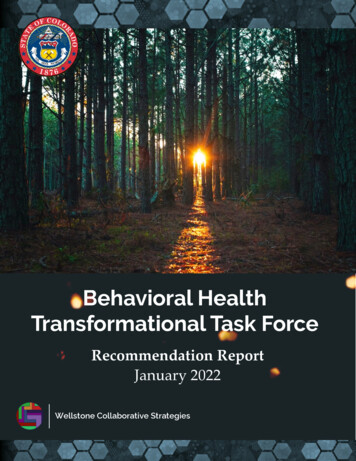
Transcription
Behavioral Health Transformational Task Force Recommendation ReportBehavioral HealthTransformational Task ForceRecommendation ReporJanuary 2022Wellstone Collaborative Strategiest1
Behavioral Health Transformational Task Force Recommendation Report73rd General AssemblyColorado General AssemblyDeveloped by theBehavioral Health Transformational TaskForce and Subpanelwith Support by:Task Force leadership: Senator Brittany Pettersen (Chair) and Representative SerenaGonzales-Gutierrez (Vice Chair)Subpanel leadership: Vincent Atchity (Chair, Mental Health Colorado) and LesleyBrooks (Vice Chair, SummitStone Health PartnersLegislative Council Staff support: Juliann JensoWellstone Collaborative Strategies consulting team: Jacob Bornstein, MarisolRodriguez, and Erik ArndtSuggested Citation: Behavioral Health Transformational Task Force and Subpanel(2022). Behavioral Health Transformational Task Force Recommendations Report. Prepared byWellstone Collaborative Strategies.Cover Photo: Joshua Woroniecki on Unsplash)nI
Behavioral Health Transformational Task Force Recommendation ReportCOLORADO GENERAL ASSEMBLYLEGISLATIVECOMMITTEE MEMBERSSen. Brittany Pettersen, ChairRep. Serena Gonzales-Gutierrez, Vice ChairRep. Judy AmabileRep. Mary BradfieldSen. Chris KolkerRep. Dafna Michaelson JenetSen. Kevin PriolaSen. Cleave SimpsonRep. Tonya Van BeberSen. Faith WinterEXECUTIVE BRANCHCOMMITTEE MEMBERSMichelle Barnes, CO Dept of Human ServicesKim Bimestefer, CO. Dept of Health Care Policy &FinancingMichael Conway, CO Division of InsuranceDianne Primavera, Lieutenant GovernorRobert Werthwein, Office of Behavioral HealthDean Williams, CO Dept. of CorrectionsBEHAVIORAL HEALTH TRANSFORMATIONAL TASK FORCEJanuary 2022Governor Polis & Members of the Seventy-third General Assembly,Submitted herewith is the final report on the recommendations from the Behavioral Health Transformational TaskForce, pursuant to the direction of the Executive Committee of the Legislative Council, authorized by Section24-75-230 (4)(b), Co. Revised Statutes, as enacted in Senate Bill 21-137.This report is the culmination of several months of hard work from both legislative and executive branchmembers of the Task Force, as well as volunteer citizen members of the Task Force Subpanel, representing manydiverse perspectives spanning the behavioral health system. The recommendations received unanimous supportfrom the Task Force. They are intended to use a once-in-a-generation funding opportunity to institutetransformational investments in Colorado’s behavioral health system that will provide immediate, sweeping, andlong-lasting change.For decades, our fractured and too often ineffective behavioral health system has left the most vulnerable withoutneeded support. As a result, Colorado ranks at or near the bottom of states in meeting our behavioral healthchallenges. Too many Coloradans are left untreated, resulting in high rates of suicide, harmful substance use, anddepression. Children are sent out of state to treat serious behavioral health challenges and suicide rates amongyoung people has gone up over 51% during last decade in Colorado. Hundreds of people are left languishing injails for months on end, without yet having been convicted of a crime, because we have failed to support them inbeing competent to stand trial. These disturbing challenges have been exacerbated by the COVID-19 pandemic,increasing domestic violence, isolation and desperation, substance use, anxiety, and depression.We know that the recommendations in this report will not solve all of the behavioral health challenges Coloradansface, but we believe they will be a transformational step forward. We are confident that if adopted by the GeneralAssembly and implemented in our communities, these investments will make significant strides in expanding ourworkforce, increasing access to early interventions and care coordination, and meeting the needs of thosestruggling the most with behavioral health challenges, such as our children, Native Americans, and the staggeringnumber of Coloradans who are caught up in the criminal justice system, often as the result of undiagnosed mentalhealth or substance use disorders. These investments will support Coloradans in every corner of the state.Thank you for your consideration and we look forward to working with you in the 2022 legislative session andbeyond to make these proposals a reality.Sincerely,Senator Brittany Pettersen & Representative Serena Gonzales-GutierrezII
Behavioral Health Transformational Task Force Recommendation ReportTable of ContentsExecutive SummarIVRecommendation Repor1The Challenges We Fac2Envisioning a New Futur5Recommendation6Appendix A. Guidance on the Development of Recommendation21Appendix B. The Proces27Appendix C. Additional Resource31Appendix D. Task Force & Subpanel Membershi32spsetseysIII
Behavioral Health Transformational Task Force Recommendation ReportExecutive SummaryColorado has a once-in-a-generation opportunity to transform its behavioral health system and makesure it works for Coloradans in every corner of the state. The 450 million in unallocated funding fromthe “American Rescue Plan Act of 2021” (ARPA) offers us a chance to make one-time transformationalinvestments that improve access to and the delivery of behavioral health care services across ColoradoIn order to face these challenges, the Governor and General Assembly formed the Behavioral HealthTransformational Task Force and Subpanel to develop recommendations in 2021. Comprised oflegislators, executive branch representatives, and diverse behavioral health practitioners and experts,the Task Force and Subpanel undertook a deliberative and transparent process. Ultimately, the TaskForce came to unanimous consensus on all funding recommendations and allocations, a framework forthe Community Behavioral Health Care Continuum Gap Grants, and an inclusion in this report ofpolicy ideas discussed during the processThe outline below summarizes these transformational investments. Such investments will mean moreColoradans with the highest needs will get the care they need, when they need it, and where they needit, from urban centers to rural communities. People with behavioral health needs will be connected toservices across the behavioral health continuum, from primary care visits to inpatient care. Theinvestments will help make our behavioral health system more equitable, culturally responsive,inclusive, and effective. They take on the critical workforce challenges we face by expandingColorado’s trained, quali ed, and diverse workforce. With this signi cant investment, Colorado canand must rise to the challenge. The investments willABCDEFGHAddress residential behavioral health needs of Colorado’s Native American Tribes.( 5 to 10MMeet the needs of children, youth, and families through youth and family residentialcare, community services, and school and pediatric behavioral health careintegrations. ( 110.5 to 141.5MInvest in increased adult inpatient and residential care.( 65 to 71M)Integrate primary care and behavioral health.( 35 to 37.6M)Address gaps in the continuum of care through grants to local governmentsand community-based organizations. ( 35 to 37.6M)Ensure people aren’t arrested and jailed for their behavioral health conditions byusing diversion, early interventions, & competency restoration.( 65 to 70M)Expand and support Colorado’s behavioral health workforce.( 80.3 to 82.7M)Invest in Colorado’s behavioral health system through care navigation &coordination, and immediate pandemic relief. ( 44.2 to 50.7M).fi:.)fi)IV
Behavioral Health Transformational Task Force Recommendation ReportBehavioral Health Transformational Task ForcRecommendation ReportIntroductioIn January 2022, the Behavioral Health Transformational Task Force reached unanimousagreement on a set of transformational recommendations that will reshape Colorado’sbehavioral health care system. The Task Force was created to ensure that this once-in-ageneration, one-time investment of 450 million, made possible by the American Rescue PlanAct (ARPA), will bring Colorado from being one of the worst ranked states in meetingbehavioral health needs to being an exemplar nationwide. With this report, the Task Forcesubmits its consensus recommendations to the General Assembly and the Governor.The OpportunityColorado has been working hard to improve its behavioral health care system over the pastthree years, and is on the precipice of major reform. Governor Polis established a BehavioralHealth Task Force by Executive Order in 2019, which developed a Blueprint for Reform thatrecommended, among other things, the creation of a Behavioral Health Administration (BHA).The General Assembly authorized the creation of the BHA in 2021, which will be operational inJuly 2022. At the same time, the General Assembly passed a number of bills directed atimproving access to treatment for Coloradans with substance abuse disorders, buildingcapacity to provide behavioral health services to children, and improving access to peersupport. One key ingredient needed for transformational change is the start-up costs forservices and infrastructureThe Task ForceARPA funds provided the impetus to bring together the legislative and executive branches aswell as diverse stakeholders to tackle the behavioral health system and determine whereinvestments would be most impactful. The 16-member Task Force was made up of a bipartisancohort of ten legislators from Colorado’s General Assembly, ve executive agency directors,and the Lieutenant Governor. A 25-member Subpanel of diverse behavioral health experts wasappointed to advise the Task Force. Additional insights and input were provided through apublic survey, stakeholder participation, and public testimony.The ReportThe rst section following the introduction describes the challenges we face. The next,envisions a new future with a series of six outcomes. The third section provides a summary ofthe nal set of recommendations agreed upon by the Task Force as well as the policies thatwere discussed. Following the conclusion are several appendices, including details of theprocess of developing and nalizing the recommendationsefi.n.fififi1
Behavioral Health Transformational Task Force Recommendation ReportThe Challenges We FaceProvide an overview of the challenge. Include howColorado is at the bottom for many behavioralhealth aspects and that the system is fragmentedand leaves too many people behind.The Challenges We FacColorado ranks at the very bottom of all states in our ability to treat the high prevalenceof adults with behavioral health challenges, according to Mental Health America’s 2022report. Approximately 27.5% of Colorado’s population, or 1.6 million adults, youth, andchildren, struggle with mental illness or substance use disorder.Nearly one third of adults with mental illness report they are not getting the treatmentthey need. Nationally, Colorado ranks near the bottom for adults, with a highprevalence of suicidal ideation, mental illness, and substance use disorder and low ratesof access to care. Colorado was ranked comparatively low for youth, but is doingincreasingly well (Colorado ranked 42nd in 2020, and 13th in 2021). Despite this brightspot, Colorado still struggles with substance use disorder among young people, andyouth suicide rates increased by more than 51% over the last decade. All of this has beenexacerbated by the COVID-19 pandemic, as hospitals are seeing more children andyouth in crisis.The result of these failings are that too many Coloradans die from overdose or suicide.People are arrested for their behavioral health challenges rather than receiving neededcare, and by default, the criminal justice system has become the state’s largest providerof mental health care. Too often, children are sent out of state to treat complex cases, andpeople with untreated mental illness wind up homeless. Our dedicated workforce isoverworked and understaffed.Colorado has a moral imperative to improve access to behavioral health services to meetthese needs. This infusion of federal funding offers Colorado a unique opportunity tobuild upon, improve, and reform our behavioral health system so that we can offer allColoradans the care they need, from prevention and early intervention to long termtreatment and support.e2
Behavioral Health Transformational Task Force Recommendation ReportToo many Coloradans from di erent walks of life experience deepdisparities and poor outcomes. Recent data reveal signi cant increases in overdoseand suicide among communities of color. Overdose data in 2021 indicate worsening incidenceamong Black and Native American communities. The pandemic has given rise to increasedsuicides in Black communities, especially among young Black girls. Communities of color areexperiencing the worst outcomes of harmful substance use and mental health disorders, whilealso experiencing the least reliable access to services. The recommendations in this report havethe potential to signi cantly change these outcomes.Our workforce struggles to keep up with the ever-growing need. Theswell of people who need care, combined with the additional strain of the COVID-19pandemic, has contributed to a nationwide health care workforce shortage. Colorado’sdedicated and compassionate workforce needs to be maintained, supported, and expanded.The current system places intense demands on the profession that contribute to signi cantburnout among team members. Rural communities often struggle to attract andretain suf cient behavioral health care professionals, while in urban areas, the cost of livingmakes it dif cult for the workforce to afford to live near where they work. Lastly, theworkforce is often not representative of the population, leading to poorer outcomes forBlack and Latino individuals, Native Americans, those who identify as LGBTQIA , those withdisabilities, and others. The workforce strategy included in the recommendations aims toaddress these challenges with signi cant and needed investments to support Colorado’sbehavioral health workforce.People don’t know where to turn. The public is generally not aware of how andwhere to access behavioral health services. When it becomes necessary to access such services,there is no well-known means to do so, and in many parts of Colorado there are few, if any,behavioral health care providers. We have a system of care that allows for providers to choosenot to provide the needed care or decline certain patients. Furthermore, there are far too manyprimary care and mental health settings where addiction is not treated at all, creating anincomplete and inaccessible system of care.“The pandemic has worsened what was already ahorrifying trend of young children, teens, and adultssu ering increased feelings of anxiety, isolation,depression, and other mental health issues. Coloradoneeds to take bold action now." Governor Jared Polisfififffififififf3
Behavioral Health Transformational Task Force Recommendation ReportChildren, youth, and families are in crisis. Children and families face myriadchallenges in accessing care for behavioral health. We have too few providers trained in thetreatment of adolescent and child mental health, and even fewer skilled in and willing to treatadolescent and child substance use. When access to care is so delayed, these children, youth,and families become involved in our juvenile justice and/or child welfare systems. We have fartoo many children who could be cared for at home or in their community if there was anadequate system of respite and therapeutic foster care to support them. Far too many end upin out-of-home placement and inappropriate congregate care settings where children andyouth struggle to achieve wellness. Those with complex cases are often sent out of state, agreat burden to them and their family. The investments included in these recommendationswork to support early intervention, community treatment, and residential care, even for themost complex cases.We arrest people for their behavioral health conditions. In Colorado, aperson with serious mental illness is more likely to be in jail than in a care facility, resulting injails and prisons acting as the biggest providers of mental health care in our state. People withthe most serious mental illnesses often cycle in and out of short-term crisis hospital care andjail, thus exacerbating their mental health challenges. This cycle has shown to be moreexpensive than preventative harm reduction and public safety investments that keep peoplehealthy and in their communities. Diversion away from the criminal justice system begins withrobust community resources, an investment that is integrated into the recommendations.Colorado falls behind in having enough behavioral health services. Forpeople seeking behavioral health services, and especially for those with severe mental healthconditions, there is a serious lack of services and a shortage of behavioral health professionals,especially in rural communities. We have far too many instances where Coloradans attempt toseek care, but are met with a system too complex and with too many challenges for meaningfulengagement. Our care coordination system is disjointed and often siloed such that choices forcare and support are limited to what a speci c organization offers rather than reaching out toall the care services that a community might have to offer. Our community mental healthcenters are burdened by payment structures and regulatory hurdles that drive uneven accessto care, that is dependent on one’s payer source. Successful treatment depends on consistentengagement that is dif cult for the most disease-burdened patients to attain.Our behavioral health system is separate from our physical healthsystem, leaving many people without early treatment. While initialattempts at integrating behavioral health care into primary care were promising, wedesperately need to invest further in this integration at more practices across the state. Manypatients with severe mental health conditions receive care in specialty psychiatry and mentalhealth settings. They deserve to receive behavioral health care where they receive the majorityof their physical care, rather than needing to engage with a second or third provider to meettheir needs.fifi4
Envisioning a New Futura behavioral health system that puts people firstThose with the highest needs get the care they need whenthey need it.People can access a service when they need it and as early inthe continuum as possible.People with behavioral health needs are connected toservices across the continuumEquitable, culturally responsive, inclusive, effective, andhigh-quality services are available in all regions acrossColorado or are connected to the highest acuity needsthroughout the stateThe state has a trained, quali ed, and diverse workforce thatis suf cient to meet the needs of Coloradans.There is integration and parity between physical andbehavioral health.e.fi.5fi123456Behavioral Health Transformational Task Force Recommendation Report
Behavioral Health Transformational Task Force Recommendation ReportRecommendationsAchieving this new future would mean that we met Colorado’s behavioral health challenges.To accomplish these outcomes, the Task Force unanimously agreed to a series oftransformational recommendations.While this funding alone will not fully realize the vision for a new future, these investmentswill bring us much closer to xing a too often broken behavioral health system. In this section,the funding allocations are summarized, followed by a more detailed description of therecommendations. A summary of the policies discussed by the Task Force comes after, and thesection concludes with a description of the framework for the Community Behavioral HealthContinuum Gap GrantsAll funding recommendations are contingent on a full scal analysis. Final funding allocationswill not necessarily fall within the ranges provided and could be lower or higher for eachrecommendation. Further, per federal requirements, ARPA funds must be obligated byDecember 2024 and spent before the end of 2026. If funds for a particular recommendation arenot used at the necessary rate they will be repurposed to other priority areasAll Behavioral Health Transformational Task Force recommendations are subject to the nalguidance issued by the United States Treasury on the use of State and Local Fiscal RecoveryFunds. All legislation drafted by the General Assembly will need further scal analysis toensure compliance, and bills based on recommendations may be funded by ARPA or any otherrevenue source under the discretion of the General Assemblyfi.fi.fifi.6
Behavioral Health Transformational Task Force Recommendation ReportSummary of Funding RecommendationsThe following is a summary of recommendations discussed and agreed to by the Task Force,highlighting the level of investment being made in each recommendation category (Figure 1).Summary of Funding Investments by CategoryFigure 1. Summary of funding investments by category: Investments are presented by order of investment level,using the low range. Note that the total for the Community Behavioral Health Continuum of Care Gap Grants isapproximately 155m, with segments going to address criminal justice and children, youth, and families.7
Behavioral Health Transformational Task Force Recommendation ReportRecommendation SummarAAddress the residential behavioral health needs of Colorado’s NativeAmerican Tribes. ( 5 to 10M)BMeet the needs of children, youth, and families through youth and familyresidential care, community services, and school and pediatric behavioralhealth care integrations. ( 110.5 to 141.5M)CInvest in increased adult inpatient and residential care. ( 65 to 71M)DIntegrate primary care and behavioral health. ( 35 to 37.6M)EAddress gaps in the continuum of care through grants to local governmentsand community-based organizations. ( 35 to 37.6M)FEnsure people aren’t arrested and jailed for their behavioral healthconditions by using diversion, early interventions, & competencyrestoration. ( 65 to 70M)GExpand and support Colorado’s behavioral health workforce. ( 80.3 to 82.7M)HInvest in Colorado’s behavioral health system through care navigation &coordination, and immediate pandemic relief. ( 44.2 to 50.7M)y.8
Behavioral Health Transformational Task Force Recommendation ReportDetailed Funding RecommendationsBelow are the detailed recommendations agreed upon by the Task Force. Note: theparenthetical numbers following each recommendation indicate that the recommendationaddresses one or more of the six outcomes listed in the section titled Envisioning a New FutureRecommendation A.Tribal Residential Behavioral Health FacilityProvide one-time funding to support the renovation of the existing Southern Ute 16-bedbehavioral health facility for inpatient services. This facility would serve tribal members inColorado with funding support coming from partners in the Four Corners states, and if thereis capacity, will serve other Native American and American Indian individuals. The cost ofoperating the facility would be fully sustainable with Medicaid and Indian Health Servicesfunding after capital cost expenditures. (1Funding Allocation: 5m (1%) to 10m (2%)Recommendation B.Children, Youth and Family InvestmentMeet the needs of children, youth, and families through youth and family residential care,community services, and behavioral health integrations in school and pediatric settings.s)9
B.1. Youth and Family Residential CareInvest in intensive youth and family residential and outpatient care, ensuring that youngpeople can access the substance use disorder treatment they need and do not need to be sentout of state for residential treatment. Instead, families are able to receive respite across the statethrough the following strategies: 1) funds to build and staff a youth neuro-psychiatric facilityat Fort Logan with capacity for up to 16 beds; 2) funds to cover the startup costs to create inhome and residential respite in 10 to 12 regions for children and families across the state; and3) operational support for 30 Youth Psychiatric Residential Treatment Facility (PRTF) &Quali ed Residential Treatment Program (QRTP) beds across the state. (1Funding Allocation: 54m (12%) to 66.5m (15%B.2. Children, Youth, and Families Community ServicesThrough the Community Behavioral Health Continuum of Care Gap Grants, ensure there is a youthand family-oriented care access point within a two-hour drive of every community. Whereverpossible, such care should augment existing facilities and allow exibility for communities toco-locate services in order to be ef cient. Such access points need to be part of the carenavigation/coordination system to ensure people are aware of services. Eligible investmentsinclude expanding state-based services, such as the I Matter youth telehealth services andgrants, for a broad range of community-based services. This includes youth- and familyoriented care navigation and coordination; expansion of evidence-based behavioral healthtreatment for youth and their families; and intensive outpatient services, including highdelity wraparound,1 youth mobile response, and expanded caregiver interventions. (2)Funding Allocation: 45m (10%) to 55m (12%B.3 School and Pediatric Care Behavioral Health IntegrationExpand behavioral health investments in schools, including School-Based Health Centers,school-based services, and school mental health resources. Funding should also buildworkforce capacity and expertise through short-term support of the Colorado PediatricPsychiatry Consultation and Access Program and the School Health Professionals grantprogram. Note that pediatric consultation is also listed in Recommendation D and would alsosupport integrated health practices outside of schools. (2Funding Allocation: 11.5m (3%) to 25m (6%Recommendation C.Adult Inpatient and Residential CarInvest in adult inpatient and residential care across the state that meets gaps for the adultpopulation. The purpose is to provide integrated step-up and step-down care to serve peoplewith serious mental illness or chronic behavioral health needs. This includes individuals withHigh delity wraparound is an evidenced based intervention that supports young people and their families todevelop one plan with a coordinated team across systems, such as behavioral health, education, criminal justice,and child welfare.1)sfl)e)))fifi10fifiBehavioral Health Transformational Task Force Recommendation Report
Behavioral Health Transformational Task Force Recommendation Reportco-occurring conditions, substance usedisorders, intellectual and/ordevelopmental disabilities, those involvedin the criminal justice system, thoseawaiting competency restoration beforestanding trial, people experiencing or atrisk of homelessness, and otherpopulations experiencing disparitiesexacerbated by COVID 19. Investmentswill support 1) adding 16 beds of capacityat Fort Logan; 2) residential step-downbeds (aim for a minimum of 125 beds); and3) recovery services (e.g., sober livinghomes, peer-run respite homes, clubhouses, and drop-in centers). Facilitiesshould, wherever appropriate, a) addressboth substance use disorders and mentalhealth diagnoses and b) exibly serviceboth criminal justice competency and civilpopulations. (1Funding Allocation: 65m (14%) to 71m(16%Recommendation D.Primary Care Behavioral Health IntegrationInvest in further integrating physical and behavioral health care in order to increase access tocoordinated whole person care for adults and children, provide early behavioral healthinterventions, and continuation of care after a crisis through primary care practices. Thisinvestment increases: 1) access to mental health and substance use disorder screening andrelevant workforce training; 2) substance use disorder and mental health treatment; and 3)coordinated referrals to other levels of care and social services. Investments include thepsychiatric consultation model (including for over-prescribers), universal contract, practicetransformation grants, and practice transformation support. Grants can be used to co-locateand integrate care in outpatient behavioral health and primary care settings and may includefunding to address health information technology, social determinants of health, telehealth,care coordination, and sustainable payment and billing practices. Note that pediatricconsultation is also listed in Recommendation B3. (2, 6)Funding Allocation: 35m (8%) to 37.6m (8%s)fl))11
Behavioral Health Transformational Task Force Recommendation ReportRecommendation E.Community Behavioral Health Continuum of Care Gap GrantProvide funding to local governments and community-based organizations to addressidenti ed behavioral health needs. Grant funding should support services along thecontinuum of behavioral health care that meet regional needs. Speci cally, there should beinvestments in evidence-based programs along the continuum, including prevention,treatment, recovery, harm reduction, care navigation and coordination, transitional housing,supportive housing, and recovery homes. To ensure coordinated and strategic expansion ofservices and avoid duplication, there should rst be a county or regional level assessment thatidenti es gaps in the service continuum for that community. Areas that need investmentshould also be identi ed. Grant funding should also include capacity building as required inSB19-222. Note that recommendations B2 and F will be operated as grants within this program,and are thus included in the larger funding range below. (4)Funding Allocation: 45m (10%) to 100m (22%) (All 155m to 225m)Recommendation F.Criminal Justice Grants: Diversion, Early Interventions,and Competency RestorationThrough the Community Behavioral Health C
from the Task Force. They are intended to use a once-in-a-generation funding opportunity to institute transformational investments in Colorado's behavioral health system that will provide immediate, sweeping, and long-lasting change. For decades, our fractured and too often ineffective behavioral health system has left the most vulnerable without


